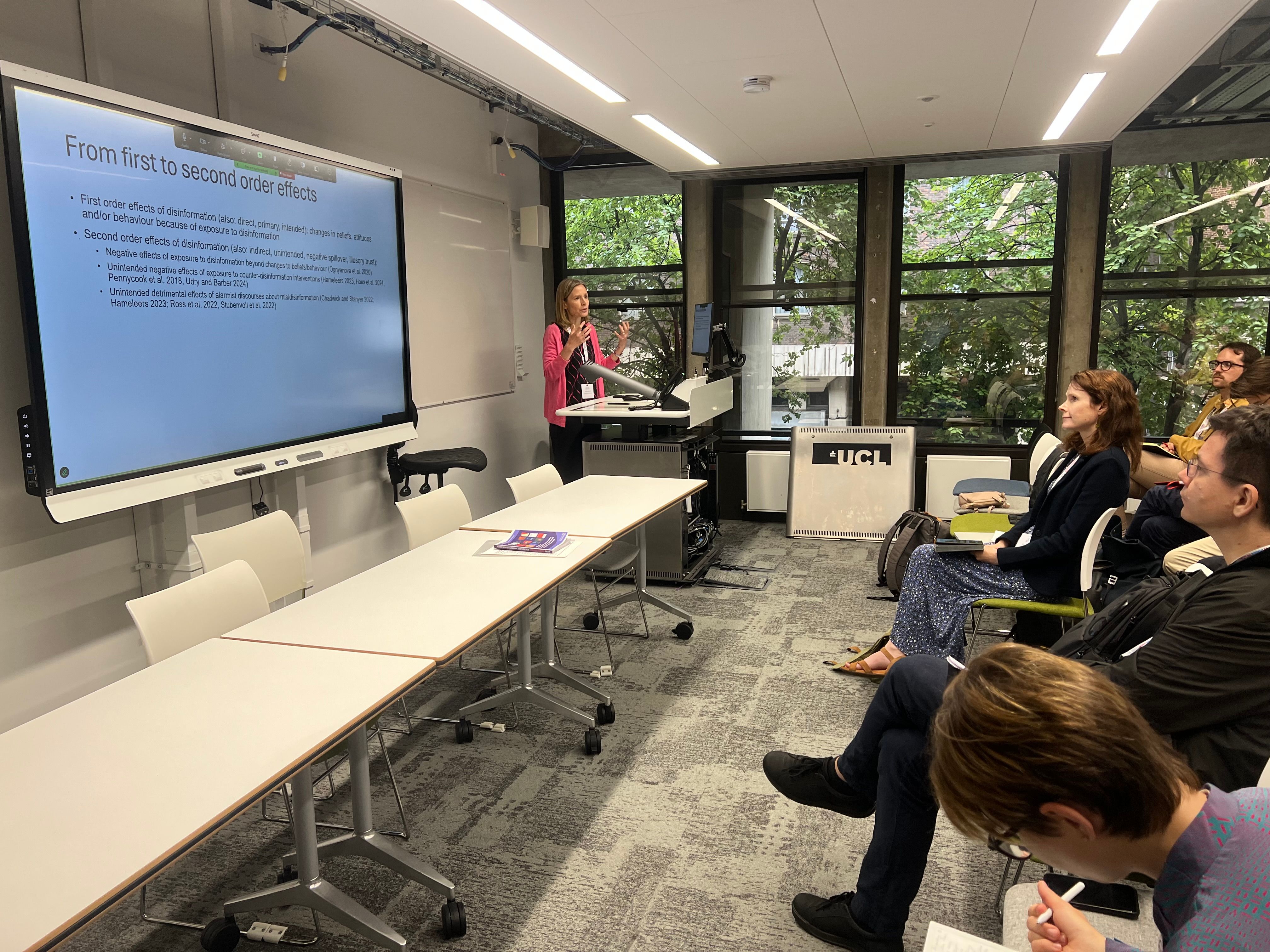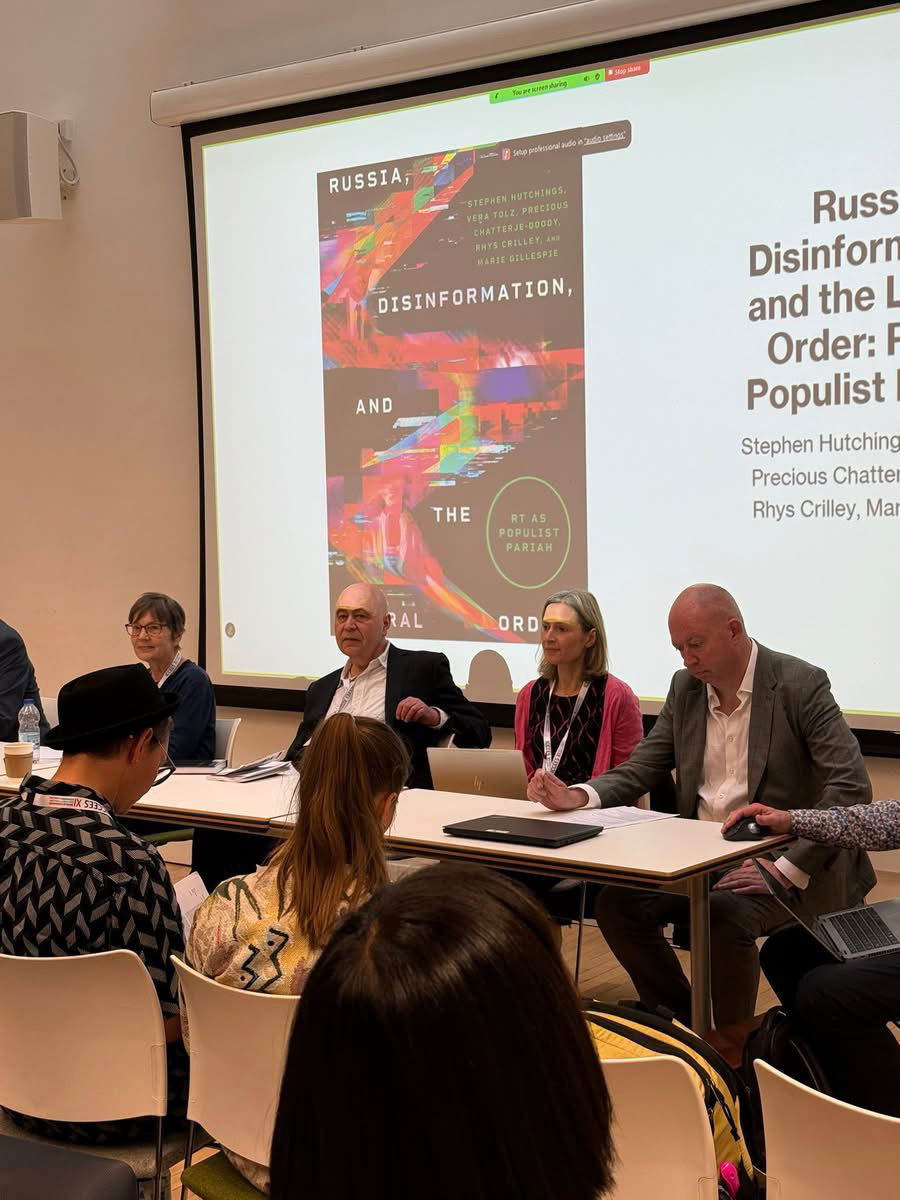Project Team at the XI ICCEES World Congress
On 23 June 2025, members of the project team participated in panels at the XI World Congress of the International Council for Central and East European Studies (ICCEES). One panel, titled Soviet Newspapers and (Counter-)Propaganda: International and Theoretical Dimensions, was chaired by Stephen Hutchings, who also served as discussant.
Reflecting research conducted for the historical strand of the project, the panel featured papers by Vera Tolz and Alex Voronovici, which explored how, between the 1917 Revolution and the consolidation of Stalin’s rule in the early 1930s, Soviet specialists in political communication sought to develop new theories of the press and propaganda. Their work was shaped by active engagement with concurrent international research on political communication and public opinion.
Vera Tolz’s paper, Gazetovedenie in the 1920s: Developing a Theory of the Press, traced the emergence of the Soviet academic discipline of "Newspaper Studies" (gazetovedenie). Flourishing during the 1920s, this field involved collaborations with German and American researchers in political communication, as well as engagement with Russian formalist and Ukrainian reception theory. Despite its significance, it has been largely overlooked by scholars of Soviet history during the Cold War and post-Soviet periods.
Alex Voronovici’s paper, Learning (from) the Enemy: Soviet Translations of Foreign Publications on Newspaper and Propaganda, examined the role of translated Western literature on political communication in shaping Soviet understandings of mass media and propaganda from the 1920s through the early 1960s. He highlighted the diverse Soviet approaches to these texts, which ranged from constructive appropriation to ideological distortion.
The panel also featured a paper by project affiliate Ekaterina Kamenskaya, a doctoral candidate in Russian and East European Studies at the University of Manchester. Her paper, The Polemic against Western Broadcasting in the Soviet Press as an Element of Soviet “(Counter-)Propaganda” in the Second Half of the 1960s, analysed how the Soviet media deployed the discourse of disinformation in an ultimately unsuccessful effort to discredit Western broadcasting in the eyes of Soviet citizens. The paper also addressed broader questions about differing Soviet and US conceptions of what constituted counter-propaganda.

Sabina Mihelj presenting her panel. Photo Credit: Maxim Aluykov
Sabina Mihelj and Maxim Alyukov also co-organized a panel exploring public perceptions of disinformation, media use and trust. The panel brought together four contributions that examined these issues from a range of methodological, theoretical and empirical perspectives. Joanna Szostek (University of Glasgow, UK) opened the panel with a paper on news media consumption and discernment of disinformation in Ukraine, drawing on a survey conducted in 2021, prior to Russia’s full-scale in invasion. Jānis Juzefovičs (Riga Stradins University, Latvia) presented a paper examining the ‘folk theories’ of journalism among Russian speakers in Latvia and Estonia, drawing on a methodologically innovative study based on essays written by participants. Maxim Alyukov (University of Manchester, UK) discussed the so-called ‘second order’ effects of disinformation and motivated reasoning in Russia, drawing on a survey experiment conducted in Russia. Finally, Sabina Mihelj (Loughborough University, UK) presented the initial results of her research on audience engagement with disinformation, based on focus groups conducted in Poland, Romania, Serbia and Arabic speaking audiences in the UK.
At a book launch roundtable, Stephen Hutchings and Vera Tolz, gave a short presentation of Russia, Disinformation and the Liberal Order of its aims, methods and findings. This was followed by comments and questions from a group of eminent national and international scholars (Profs. Ben O’Loughlin, Sabina Mihelj, Helge Blakkisrud and Peter Rutland), and a full discussion with the wider audience. For more information about the book, please visit the relevant page of our project website (https://www.mis-translating-deceit.com/publications/russia-disinformation-and-the-liberal-order-rt-as-populist-pariah?c=relevant-non-project-funded-team-member-outputs)

L-R: Profs Vera Tolz, Stephen Hutchings, Sabina Mihelj, Ben O'Laughlin. Photo Credit: Alex Voronovici